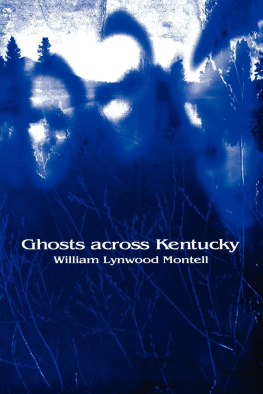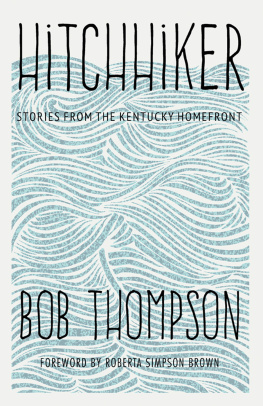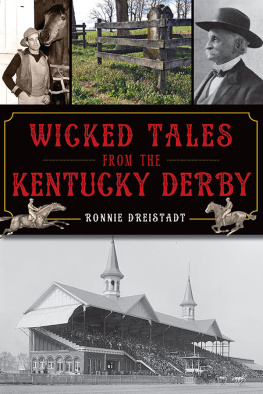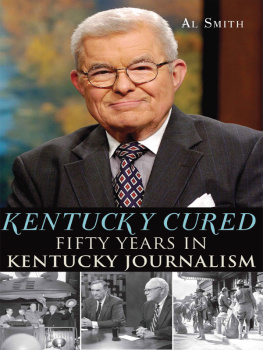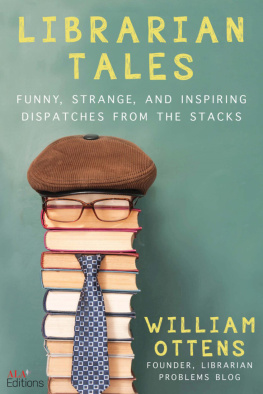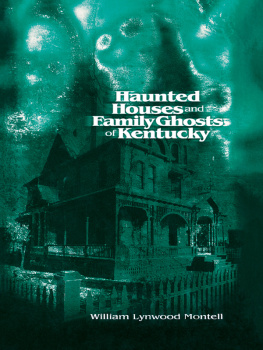Publication of this volume was made possible in part by a grant from the National Endowment for the Humanities.
Copyright 2003 by The University Press of Kentucky
Scholarly publisher for the Commonwealth, serving Bellarmine University, Berea College, Centre College of Kentucky, Eastern Kentucky University, The Filson Historical Society, Georgetown College, Kentucky Historical Society, Kentucky State University, Morehead State University, Murray State University, Northern Kentucky University, Transylvania University, University of Kentucky, University of Louisville, and Western Kentucky University. All rights reserved.
Editorial and Sales Offices: The University Press of Kentucky 663 South Limestone Street, Lexington, Kentucky 40508-4008 www.kentuckypress.com
09 10 11 12 13 10 9 8 7 6
Library of Congress Cataloging-in-Publication Data
Montell, William Lynwood, 1931
Tales from Kentucky lawyers / William Lynwood Montell.
p. cm.
Includes descriptive accounts, provided in conjunction with stories told during interviews.
ISBN 0-8131-2294-5 (hardcover : alk. papoer)
1. LawKentuckyAnecdotes. I. Title.
K184.M66 2003
349.769dc21
2003011395
ISBN-13: 978-0-8131-2294-6
This book is printed on acid-free recycled paper meeting
the requirements of the American National Standard
for Permanence in Paper for Printed Library Materials.
Manufactured in the United States of America.

Member of the Association of American University
INTRODUCTION
Lawyers know how to spin a good yarn. They also know how to fascinate an audience. My announcement in early 2000 that I would collect stories from lawyers and judges was met with great enthusiasm by members of the legal profession, by academicians, and especially by the general public. Fortunately, many lawyers expressed great interest in participatinggetting them to set aside time for a storytelling session and general interview was another matter. All those who found time, however, recounted wonderful stories: sometimes fanny, sometimes sad or frightening, sometimes thought-provoking, but always interesting.
Many people have had experiences with lawyers that they would rather not discuss, but over the past few months of traveling and interviewing lawyers and judges, I have found dedicated, sincere, and concerned professional individuals who, without lengthy hesitation, willingly shared their many stories and insights concerning the legal system. They were especially willing to trust me upon learning that I have authored numerous scholarly books over the years about local life and culture.
I certainly wished to preserve the wonderful stories in this volume, but I also wanted to preserve some part of the storytellers themselves. The stories speak for themselves; it is my hope that the reader also will see the humor, seriousness, and wisdom that are part and parcel of these great storytellers.
Two primary criteria were established prior to contacting anyone about a storytelling session. First, the teller should generally be a middle-aged or older lawyer practicing alone or as a member of a small firm. The rationale for this was that such lawyers would most likely have interesting memories from which to draw, since younger attorneys and those practicing in larger firms around the state tend rather to specialize in a particular aspect of the law.
This led naturally to a second criterion: the law offices of these storytellers should typically be located in small to medium-sized towns or cities across the commonwealth. Practices in these locales would tend to guarantee both a greater diversity of clients with varying socioeconomic backgrounds and a wider range of interesting and illuminating cases. Thanks to references and frequent contacts made by other lawyers on my behalf, I was fortunate to be able to record stories told by lawyers and judges in every geographic region of Kentucky, including the Jackson Purchase, Pennyroyal Region, Western Coal Field, Blue-grass Region, and Eastern Coal Field. (It should be pointed out that the Cumberland Plateau and Outer Bluegrass also were included by name in these categories for many, many years.) Moving from west to east, persons interviewed lived and/or practiced in the following towns and cities: South Fulton, Mayfield, Paducah, Murray, Eddyville, Princeton, Cadiz, Madisonville, Hopkinsville, Greenville, Owensboro, Franklin, Bowling Green, Leitchfield, Louisville, Edmonton, Shelbyville, Carrollton, Russell Springs, Jamestown, Lexington, Williamsburg, London, Stanton, Manchester, Maysville, Beattyville, Frenchburg, Morehead, Harlan, Hazard, Hindman, Prestonsburg, and Pikeville.
The kinds of stories chosen for the collection fall into one of a dozen or so broad categories or tale types chosen specifically because of their human-interest potential. As I listened to and recorded these stories, many sub-categories or tale types emerged from four overarching categorieshumorous, dramatic, intriguing, and challengingthus resulting in the many group classifications that are included herein. The initial four categories eventually gave way to twenty-four all together. But sex, theft, court procedures, illegitimacy, blunders, animals in court, mental and physical disability, politics, domestic disputes, and murder came out again and again in virtually all the interviews. That these themes emerged frequently should come as no surprise to anyone.
Nor should we be surprised that lawyers and judges are almost always central to these accounts. Nevertheless, note that personal actions and interactions, and not points of law, are central to each story. While the essence of these accounts may deal with certain legal themes, the focus of these stories is always people. Folklorists stress the fact that people everywhere build their lives in accordance with folk beliefs, customs, practices, and stories heard on a daily basis. It takes thematic stories and tales to assist people in dividing their daily lives along meaningful lines.
The actual interviews took place without a set script. All told, I interviewed thirty-nine lawyers and judges. After we sat down to talk, I enthusiastically strove to put the subject at ease by gathering some background personal and professional information, then gradually worked into the lengthy interview, asking, for example, What is a chief difference in the legal profession then and now? After a brief period spent on that subject, I used follow-up, open-ended questions such as What is one of your favorite memories of a lawyer friend during your early years? so as to encourage them to tell me more. Each of the thirty-nine interview sessions was recorded on either a battery-powered or an electric tape recorder. I then transcribed the interview tapes at home, a task typically requiring a minimum of nine to eleven hours for each hour of taped interview. Portions of all the interviews have been used, but not all the stories recorded during each interview have been used.
In reading the stories herein, it will become immediately apparent that this is not a collection of lawyer jokes. Many of the stories are very funny, but many of them are also poignant in that they keenly affect peoples senses. Others are painful, even horrifying. The courts and the states legal system do not always see people at their best. In fact, by the time a legal situation has found its way to court, the plaintiffs and defendants are often at their wits end. If the problem they are confronting could easily have been solved, a satisfactory pre-court solution would already have been accomplished. Lawyers and judges must often deal with people at their very worst and try to find or effect solutions to problems that are basically unsolvable. Is it any wonder that being a lawyer is so stressful?



 Member of the Association of American University
Member of the Association of American University

